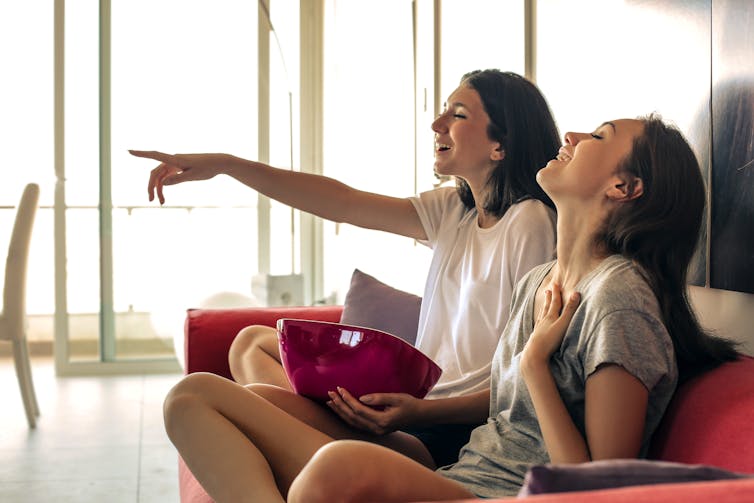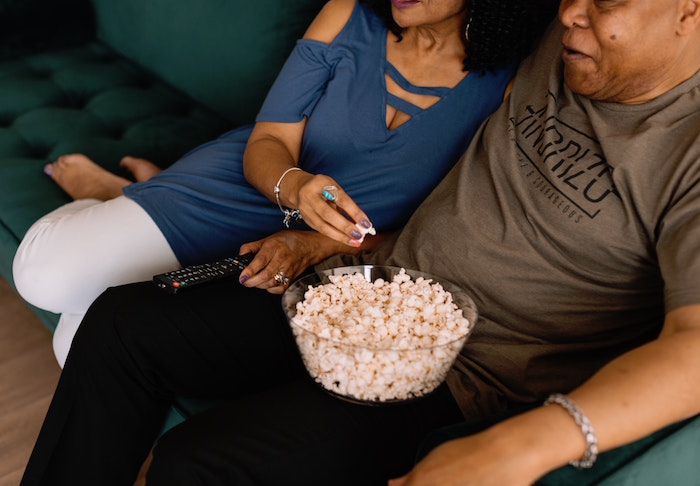It’s easy to feel guilty when you’re lazing around in front of the TV in your pyjamas, eating ice cream straight out of the tub. But it’s not an unusual activity in lockdown. The extended nature of the pandemic has turned attention to the impact that it is having on our collective mental health.
Many mental health organisations have proposed strategies to protect mental health, such as exercising, sleeping well and enjoying nature. This may make us assume that watching TV is ultimately bad for our mental wellbeing.
But there is evidence to suggest that watching TV can also be good for us – if we go about it the right way.
In many parts of the world there has indeed been a reported surge in watching TV and online streaming during the pandemic. When told to stay at home during the first lockdown in the UK, for example, people watched an average of more than six hours of TV and online video content each day, a rise of about 30% compared to the previous year.
There has also been an increase in subscriptions to video streaming services, with almost 12 million people in the UK signing up for a new service during the lockdowns. Netflix now has more than 200 million subscribers worldwide.
The benefits of positive emotions
So how can TV support our wellbeing? We know that art can stir intense emotions. More often than not, we are drawn to musicals, podcasts, TV programmes, films and other artistic productions because we want to experience strong emotions.
According to research by Martin Seligman, a leading positive psychology researcher at the University of Pennsylvania, experiencing positive emotions is one of the building blocks of our wellbeing. It would therefore make sense for us to watch more feelgood shows on TV to increase positive emotions.
According to Barbara Fredrickson, a psychologist at the University of North Carolina, experiencing positive emotions can have a long-term, sustainable impact on wellbeing. When we feel good, our minds open and our awareness broadens – making us more able to think creatively. As a direct consequence, a domino effect of psychological processes is set in motion, incrementally building positive resources such as resilience that can be drawn upon in times of need.
Positive emotions also have a direct impact on the body. One convincing study demonstrated that positive emotions can “undo” the negative consequences of experiencing unpleasant physical symptoms associated with emotions such as stress or anxiety. In this study, participants’ baseline heart rates were measured before they were manipulated into an anxious state by being asked to prepare a speech on an unknown topic.
Following this “anxiety induction task”, participants were randomly assigned a film clip that elicited either amusement, contentment, neutrality or sadness. Once they had watched them, participants’ heart rates were measured again. The researchers discovered that the heart rates of participants who experienced amusement or contentment returned to baseline significantly quicker than participants who experienced neutrality or sadness.
What and how to watch
That said, TV doesn’t necessarily always make us feel better. For some people, very dark themes, perhaps too close to home, can be depressing. Watching TV mindlessly, just zapping channels to pass time, can also make us feel a lack of control. And it can make us miss other opportunities to intentionally boost our wellbeing.
Equally, we must be cautious about binge-watching programmes to the degree that they prevent us from functioning effectively in our everyday lives.
So what should you watch to reap the benefits of the wellbeing research? We’re not TV or film critics, but below are some examples of programmes that we have enjoyed and we think may be particularly suited to boosting positive emotions.
If you are looking for inspiration – which can easily be lost in the monotony of lockdown – check out Expedition Happiness, which explores the beauty of nature through an epic road trip in a refurbished school bus. Similarly, Night on Earth, Queer Eye and Brené Brown: The Call to Courage also have many confidence-boosting moments and engaging ideas about vulnerability and courage.

Sometimes, a laugh can go a long way too. Programmes like Brooklyn Nine-Nine, Parks and Recreation, The Office (UK or US versions) and Schitt’s Creek provide hours of humour and comedy. They are all long-running series with many episodes to enjoy.
One of the hardest things about lockdown is being cut off from interactions with other people. Watching series that enable you to get to know the lead characters well over time can be a useful way to boost feelings of social connectedness. Shows such as Friends, Grace and Frankie, Frasier and The Good Place can help achieve this.
Or, instead of channel surfing or browsing, do some research online to find something that falls under one of the categories above so that you can go straight to the chosen programme. This will feel more intentional, giving you a greater sense of agency and control.
Another way to reap the benefits is to watch your favourite programmes with other people – even though that may be virtually at the moment. It is good to experience social connection when watching something you like and it can be fun to discuss the plot. After all, many of the watercooler discussions we enjoy at work or when chatting to friends are about the latest Netflix show.
When you find a programme that gives you positive emotions, learn to savour the experience rather than being drawn to binge-watching. This way you can enjoy the experience and anticipate the positive emotions of watching another episode at a later time.
By taking control of our TV-watching habits, we may be able to boost our wellbeing during these challenging times. Happy viewing.
Christian van Nieuwerburgh, Professor of Coaching and Positive Psychology, University of East London and Kirsty Gardiner, Lecturer in Positive Psychology, University of East London
This article is republished from The Conversation under a Creative Commons license. Read the original article.














